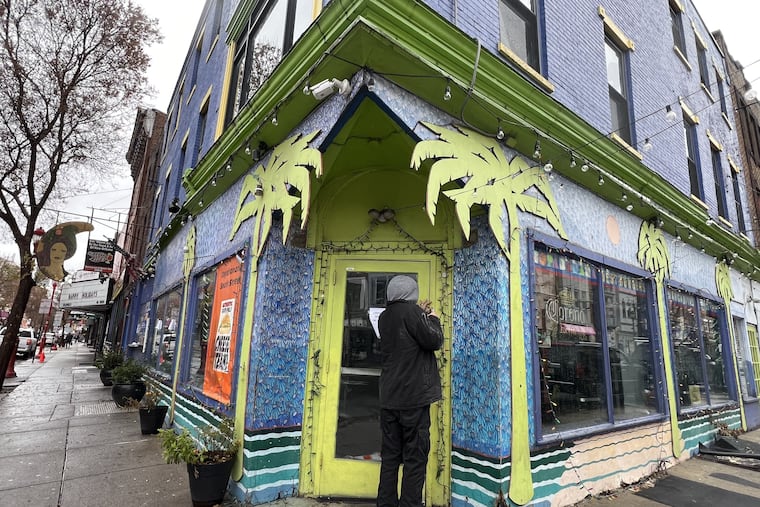South Street landmark Copabanana is moving as part of its bankruptcy case
Copabanana will not go far — only two doors away. The margaritas, Spanish fries, and burgers are expected to follow.

Copabanana, an iconic bar-restaurant that has helped define South Street’s counterculture scene, has vacated its landmark home of 45 years as a condition of ongoing bankruptcy proceedings.
It is not going far from the southeast corner of Fourth and South Streets. This week, operators plan to reopen Copabanana two doors away, in the long-shuttered space that was last Hurricane Alley, a bar that shared ownership.
Nick Ventura, who operates Copabanana and is listed in court records as its majority shareholder, said the rent for the adjoining storefronts at 340 and 342 South St. would be “one-third of the $36,000 we’re now paying.” It is about the same size as the original, with 60 seats in the dining room and about 25 at the bar.
» READ MORE: A history of Copabanana from 2015
The corner, whose address is 344 South St., is expected to be marketed for lease soon, joining other large, empty food-and-beverage spaces on the block, including the former Jon’s Bar & Grille and Dobbs on South. The building owner is a New York-based limited liability corporation.
Copabanana is not affiliated with the Copabanana at 40th and Chestnut Streets in University City. They split ownership a dozen years ago.
Copabanana’s backstory
At its opening in October 1978, Copabanana joined such businesses as Jim’s Steaks, Eye’s Gallery, the Theatre of Living Arts, and Famous 4th Street Deli. Queen Village at the time was a neighborhood in flux following an aborted attempt to turn the east-west street, a demarcation between Center City and South Philadelphia, into the Crosstown Expressway running from river to river.
Founder Bill Curry, who had left his job as an Inquirer columnist, took over an old-time bar called Turks, where revelers pushed on a phone-booth wall to climb a hidden staircase into a Prohibition-era speakeasy.
Curry drew on his Miami upbringing for Copabanana’s tropical feel. At the outset, burgers were grilling in the window and bartenders created margaritas not with mixers but with fresh lime juice. Everyone seemed to order “Spanish fries,” amped by sizzling onions and jalapeños. A window seat was the ideal viewing spot for the daily South Street parade or for parents to kill time while their teenagers took in a show at the TLA.
Although Curry has long said that Copabanana’s name predated the Barry Manilow hit “Copacabana,” the song reached the Top 40 charts a few months before the opening. No matter. The wordplay was a brilliant piece of marketing.
Three years later, Curry and partner Judy DeVicaris expanded to 340 South St., next door to the TLA. That space over the years housed other Curry-owned food-and-drink ventures, including the upscale New Orleans-inspired Cafe Nola and the wine bar Redwood.
Cafe Nola, whose South Street heyday was 1981 to 1996, was the pet project of DeVicaris, who died in 2021.
“Lush fabrics, deep colors, an Art Deco bar, and an adventurous New Orleans-inspired menu attracted a diverse Philly crowd as well as celebrities such as Vaclav Havel and Bruce Springsteen,” The Inquirer wrote in her obituary.
In a way then, Copa is coming home.
Curry, who has health problems, could not be reached for comment. He is listed as an owner of the corporation, along with Ventura and Joe Cuculo, who died in June.
Copabanana’s woes
Copabanana had suffered in the last decade, after Curry took ill and as South Street’s fortunes waned. In 2016, the city Health Department shut it down for two days over sanitation issues, including the use of flattened cardboard as floor mats in the kitchen. The same year, Daniel Christensen, a previous Copabanana partner, nephew of Curry, and former chairman of the South Street District, pleaded guilty to wire fraud. He had used $1.4 million meant to promote the district to pay bills at Copabanana. He repaid the money, and died before sentencing.
The pandemic hurt business, as did the unrest following the murder of George Floyd in 2020 and a mass shooting in 2022. In January 2023, Copabanana started a GoFundMe campaign to help pay its bills. Despite Ventura’s pleas, the restaurant raised only $165 of its $250,000 goal.
In May, the business filed for Chapter 11 bankruptcy protection — the third such filing in the last decade.
Though reopening in December could be challenging, Ventura said the lower rent and certain operational changes would make the restaurant “more fiscally responsible.”